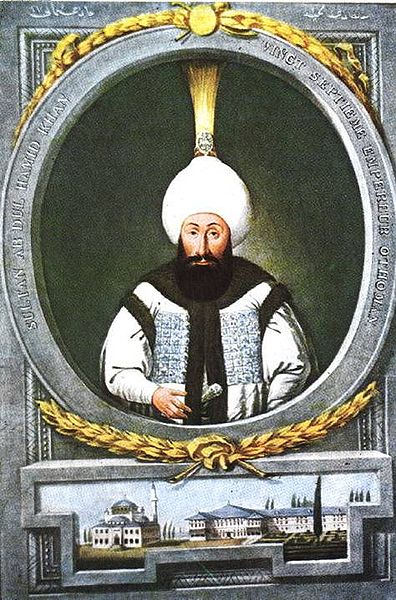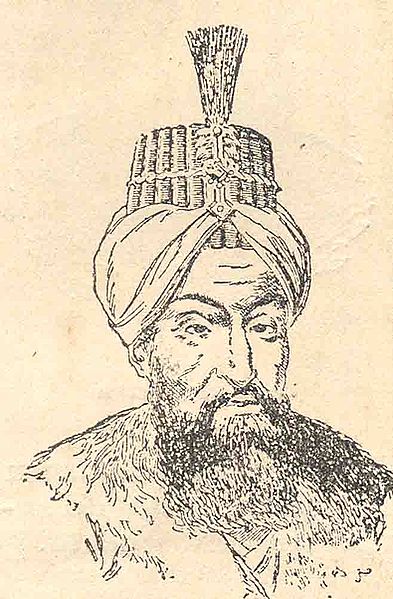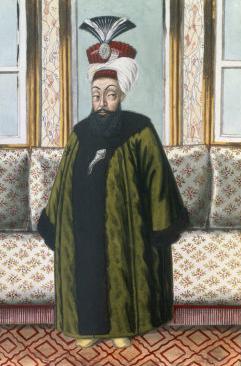<Back to Index>
- Chemist Torbern Olof Bergman, 1735
- Poet Publius Ovidius Naso (Ovid), 43 B.C.
- Sultan of the Ottoman Empire Abdul Hamid I, 1725
PAGE SPONSOR



Abdülhamid I, Abdul Hamid I or Abd Al-Hamid I (Ottoman Turkish: عبد الحميد اول `Abdü’l-Ḥamīd-i evvel), called the Servant of God (March 20, 1725 – April 7, 1789), was the 27th Sultan of the Ottoman Empire. He was the son of sultan Ahmed III (1703 – 30) and succeeded his brother Mustafa III (1757 – 74) on January 21, 1774. He was born in Istanbul. His mother was Râbi'a Sharmi Sultana.
Abdülhamid was imprisoned for most of the first forty-three years of his life by his cousins Mahmud I and Osman III and his older brother Mustafa III, as was custom. He received his early education from his mother Râbi'a Sharmi Sultana, from whom he studied history and learned calligraphy.
His
imprisonment made him aloof in regard to state affairs and malleable to
the designs of his advisors. Yet he was also very religious and a pacifist by nature. At his accession the financial straits of the treasury were such that the usual donative could not be given to the janissaries. War was, however, forced on him and less than a year after his accession the complete defeat of the Turks at Battle of Kozluja led to the humiliating Treaty of Küçük Kaynarca on July 21, 1774. In spite of his failures, Abdülhamid was regarded as the most gracious Sultan of the Ottomans. He administrated the fire brigade during the fire in 1782. In Istanbul, he won the admiration of his people as
he was so religious that he was called a "Veli" (saint). He also traced
a reform policy, followed the governmental administrations closely and
worked with statesmen. When Abdülhamid came to the throne the army
asked for gratuities and the sultan claimed that: "There are, no
longer, gratuities in our treasury, all of our soldier sons should
learn". He also began the restoration of the military system. He is
credited with better education standards. He tried to renovate the
Janissary corps and the naval forces. He established a new artillery
troop. He made a census in the Janissary corps. Slight successes against rebellious outbreaks in Syria and the Morea could not compensate for the loss of the Crimea which
Russia greatly coveted. War was once more declared against Russia in
1787 and in the following year Russians were joined by Austria. The Swedes and Prussians joined the conflict on the side of the
Ottomans, but provided no assistance. While the Ottomans held their own
in the conflict they ultimately lost with Ochakov falling in 1788 to the Russians (all of its inhabitants being massacred.) Abdülhamid died four months later at the age of sixty-four in Istanbul. He was buried in Bahcekapi, a tomb he had built for himself. His wives were: Valide Sultan Ayse Seniyeperver, Valide Sultan Naksh-i-Dil Haseki Sultan (there have been speculations that she was a cousin of Napoleon's wife Josephine),
Hatice Ruh-shah, Huma Shah, Ayse, Binnaz, Dilpezir, Mehtabe, Misl-i
Na-yab, Mu'teber, Fatma Sheb-Safa Nevres and Mihriban. His concubines
were: Nukhet-seza Hanimefendi: First concubine; Ayse Hanımefendi: Second concubine. His sons were: Mustafa IV (1807 – 08) (his son by Ayse Seniyeperver), Mahmud II (1808 – 39) (his son by Naksh-i-Dil Haseki), Murad, Nusret, Mehmed, Ahmed, and Suleyman. His daughters were: Esma, Emine, Rabia, Saliha, Alimsah, Durusehvar, Fatma, Meliksah, Hibetullah and Zekiye Sultans.